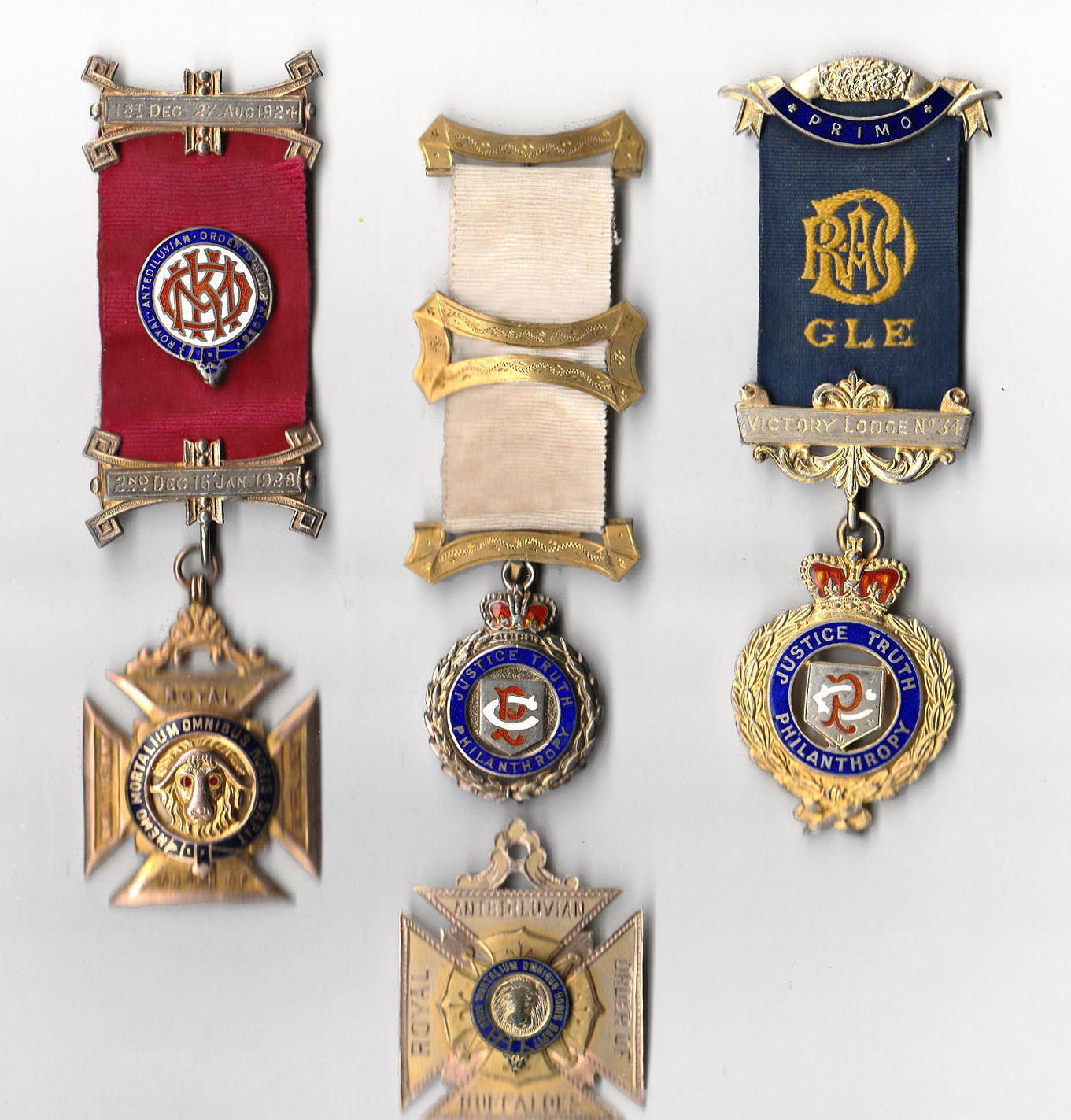Royal Antediluvian Order of Buffaloes

The Royal Antediluvian Order
of Buffaloes (RAOB) is one of the largest fraternal organisations in the
United Kingdom The order started in 1822 and is known as the Buffs to
members. The RAOB organisation aids members, their families, dependents
of former members and other charitable organizations. The Order's motto
"No Man Is At All Times Wise" (Latin: Nemo Mortalium Omnibus Horis Sapit)
and has the maxim of "Justice, Truth and Philanthropy".
The order has a Rule Book,
Manual of Instruction and Ceremony Lectures issued and revised by the Grand
Lodge of England based at Harrogate in England. The 'lodge' description for
branch organisation and headquarters was adopted in imitation of Freemasonry
but RAOB is completely open in its objectives, activities and ritual. The RAOB
was begun in the Harp Tavern by the artist Joseph Lisle and comedian William
Sinnett along with other stage hands and theatre technicians in August 1822.
It drew its then name of The Buffaloes from a popular song of the time
We’ll chase the Buffalo. This first meeting is historically the Phoenix
Lodge No.1. As members toured the country with various shows lodges were
opened in other towns.
During the 19th century the
Order spread throughout the British Commonwealth and Lodges now exist in
Britain, Northern Ireland, Canada, Australia, New Zealand, South Africa,
Middle East, India, Africa, Gibraltar and Cyprus.
As the Order spread through the
United Kingdom, when a lodge opened in a new area, it became the Mother
Lodge, from which subsequent Minor Lodges would be opened. This Mother
Lodge would support and advise new lodges on rules and administration of
membership. These Mother Lodges developed into the body responsible for
administration and organisation and as the Order grew District Grand Lodges
and later Provincial Grand Lodges were opened.
In April 1866 a Grand Lodge
(later known as the Grand Lodge of England) was formed to control the Order,
to set laws, to establish procedures and manage administration. Divisions
within the Order led break-ups and the Grand Lodge of England fractured into
smaller 'Banners' between which there was often rivalry. One Banner became the
Grand Lodge of England Ltd, wrongly believing that by forming as a
company they could gain exclusive usage of the name. The 'Grand Surrey Banner'
proclaimed itself Mother Lodge of the World. Dozens of Banners were
created around London and many more in elsewhere.
The Order's honorifics of
"royal" when it did not have royal patronage nor a Royal charter and
"antediluvian" when in fact its foundations are of historical record, or that
it is an "Order" although it had no standing nor recognition from any house of
nobility, are meant to add mock solemnity to its fellowship status and have no
more veracity than its having anything to do with the buffalo.
The Seditious and Riotous
Assembly Acts of the late 19th century affected the gatherings of clubs
throughout Britain. To overcome this issue and show the Buffaloes were not
subversive to the interest of the state, the Order described itself as the
"Loyal Order of Buffaloes"'. The word "loyal" was often mispronounced as
royal, and soon stuck.
The addition of "Antediluvian"
(meaning before the time of the flood in the Bible) occurred in the 1850s.
However, the Royal Warrant Act
required any organization using the 'Royal' prefix to register with the Lord
Chamberlain's Office and to desist from using the title if permission was not
granted. Since the Buffaloes had been using the title from the 1840s, the Lord
Chamberlain agreed that no objection would be raised on continued use of the
title on the grounds of long usage, provided no act by the Order arose that
would disgrace its use.
The First World War led to
temporary or even permanent closure of many Lodges due to the enlistment of
members. The Buffs supported the war effort through supplying ambulances to
bring wounded soldiers back from the front lines. Initially six motorized
ambulances were purchased and sent with each one manned by 'Volunteer Buffs'.
More followed and, on their return after the war, the ambulances formed the
first ambulance service in England.
In 1926, Lord Alston succeeded
in persuading the Order to purchase Grove House, Harrogate, for use as an
orphanage to which every active member contributed a Ha'penny (half of one old
penny).
When the orphanage was no longer a requirement after the state
took over responsibility for orphans, the Order began a new charity fund which
is still in place today.
During the Second World War, the
Order offered Grove House for use as a military hospital. In 1949, an
international convention in Glasgow reported over 1000 attendees from around
4000 lodges, and was to celebrate 130 years of the Order. Sir Andrew Murray,
the Lord Provost, addressed the conference
The RAOB continues its work in
the local community helping all those its members promise to help and assist
in times of difficulty or need. Minor Lodges throughout the United Kingdom and
the rest of the world raise money for charities and charitable causes.
As with many organizations
dating from the pre-Victorian period, there has been a noticeable decline in
membership since a boom in the 1970s. By 2012 Scotland's oldest lodge, the
Royal Edinburgh Lodge No. 854, was down to 25 members.

